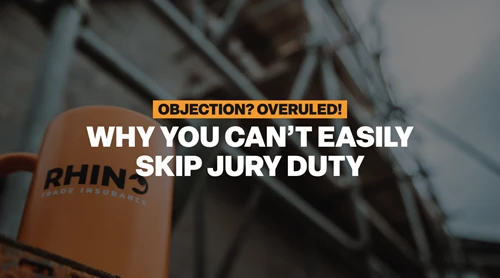In the busy world of UK construction, ensuring that workers are qualified and competent is critical. Enter the Construction Skills Certification Scheme (CSCS) card - a vital tool designed to improve standards and safety on construction sites.
But what exactly is a CSCS card, and does every tradesperson need one? This blog will delve into the details, providing clarity on this crucial aspect of the construction industry.
Understanding the CSCS Card
The CSCS card is a tangible testament to a worker's qualifications and competence within the construction industry. Established in 1995, the scheme aims to ensure that individuals working on construction sites possess the necessary training and qualifications for the job they perform. Essentially, the card is proof that the holder has the appropriate training, qualifications, and experience for the type of work they carry out on-site.
Types of CSCS Cards:
CSCS cards come in various colours, shapes and size, each representing different levels of qualifications and expertise:
Green Card (Labourer): This entry-level card is for those performing general labouring duties. To qualify, individuals typically need to complete the Level 1 Award in Health & Safety in a Construction Environment and pass the CITB Health, Safety and Environment Test.
Red Card (Trainee): This temporary card is for trainees registered on a recognised construction-related qualification. It signifies that the holder is working towards full qualification.
Blue Card (Skilled Worker): For tradespeople with a Level 2 NVQ or SVQ in a construction-related field. This card shows that the holder is skilled and competent in their trade.
Gold Card (Advanced Craft and Supervisor): This card is for advanced craft workers with a Level 3 NVQ or SVQ. There's also a supervisory version for those in supervisory roles, demonstrating higher-level skills and responsibilities.
Black Card (Manager): For individuals with a managerial role in construction. Holders typically have a Level 4 or higher NVQ or SVQ.
White/Yellow Card (Professionally Qualified Person): For professionals such as architects, surveyors, and consultants who are members of recognised professional bodies.
White/Grey Card (Construction Related Occupation): For workers whose occupations do not fit into other categories but still require a presence on construction sites.
Red Card (Experienced Worker): A temporary card for experienced workers who are registered to complete an NVQ or SVQ.
Why the CSCS Card Matters
The CSCS card plays a clear role in maintaining high standards on construction sites. Here are some reasons why it's essential:
- Health and Safety: Construction is inherently hazardous. The CSCS card ensures that workers have the necessary health and safety training, reducing the risk of accidents and injuries on site.
- Competence: The card verifies that a worker has the qualifications and experience required for their specific role. This helps maintain high standards of workmanship and professionalism.
- Employer Confidence: Employers can trust that cardholders are qualified and competent, streamlining the hiring process and ensuring that projects are completed safely.
- Site Access: Many construction sites across the UK require their workers hold a valid CSCS card to gain entry. This has become a standard practice, emphasising the card's importance in the industry.
- Career Progression: Holding a CSCS card can open doors for career advancement. It allows workers to demonstrate their skills and commitment to professional development, making them more attractive to employers.
Does Every Tradesperson Need a CSCS Card?
While the CSCS card is highly beneficial, it is not a legal requirement. However, its necessity depends on several factors:
Employer Requirements: Many employers and contractors mandate that their workers hold a valid CSCS card. This is particularly true for larger companies and significant construction projects. If you work for an employer or contractor that requires it, obtaining a CSCS card is essential.
Site Regulations: As mentioned earlier, numerous construction sites require workers to hold a CSCS card for entry. This is often stipulated in site health and safety policies. If you plan to work on such sites, you will need the appropriate card.
Freelance and Self-Employed Tradespeople: If you are self-employed or work as a freelancer, having a CSCS card can enhance your professional credibility and make you more competitive. Clients & contractors are more likely to hire individuals who can prove their qualifications and safety training.
Specific Trades: Certain trades might have additional or alternative certification schemes. For instance, electricians might need to comply with standards set by bodies such as the National Inspection Council for Electrical Installation Contracting (NICEIC) or the Joint Industry Board (JIB). However, having a CSCS card can still be beneficial in demonstrating overall construction site competence and safety awareness.
Future Industry Trends: The construction industry is evolving, with increasing emphasis on health, safety, and competence. As these standards become more stringent, the CSCS card may become more widely required. Preparing ahead by obtaining your card can future-proof your career.
How to Get a CSCS Card
Obtaining a CSCS card involves several steps:
- Determine the Right Card: Based on your role and qualifications, identify the appropriate CSCS card type. The CSCS website offers detailed guidance on this.
- Pass the CITB Health, Safety and Environment Test: This test assesses your knowledge of health, safety, and environmental issues relevant to construction. The test must be passed within the last two years before applying for the card.
- Gather Qualifications: Ensure you have the necessary qualifications for the card you are applying for. This might involve obtaining NVQs or SVQs for specific trades.
- Apply for the Card: Applications can be made online via the CSCS website or through postal forms. Ensure you have all required documentation, including proof of qualifications and test results.
- Pay the Fee: There is a fee for the card application, which varies depending on the type of card. Payment can usually be made online.
- Receive Your Card: Once approved, your CSCS card will be sent to you, typically within a few weeks. It is valid for several years, depending on the card type, after which it must be renewed.
Common Misconceptions About the CSCS Card
Despite its importance, there are several misconceptions about the CSCS card. Let's debunk a few:
"It's Just a Piece of Plastic": The card represents much more than just a physical ID. It stands for your training, qualifications, and commitment to safety and professionalism in the industry.
"Only Labourers Need It": While labourers do need a CSCS card, so do skilled workers, supervisors, managers, and professionals. There are different cards for different roles, all contributing to a safer and more competent workforce.
"It's a One-Time Thing": CSCS cards need to be renewed periodically, typically every five years. This ensures that the cardholders' knowledge and skills are up-to-date.
"I Don't Need One Because I'm Self-Employed": Even if you are self-employed, having a CSCS card can enhance your credibility as well as open up more job opportunities. It demonstrates to potential clients and contractors that you are qualified and committed to safety.
Ensure Safety On-Site and Get Covered
The CSCS card remains a crucial element in promoting safety, competence, and professionalism. While not legally mandatory, its benefits are clear. From enhancing job prospects to ensuring compliance with site regulations, the CSCS card is an invaluable asset for tradespeople across the sector.
Whether you are just starting your career or are an experienced professional, obtaining the appropriate CSCS card can significantly impact your success and safety in the industry.
For all of your trade insurance needs, why not call the Rhino Trade Insurance team for a quote today? Our brokers will get your a tailored quote in seconds - 0116 243 7904.




